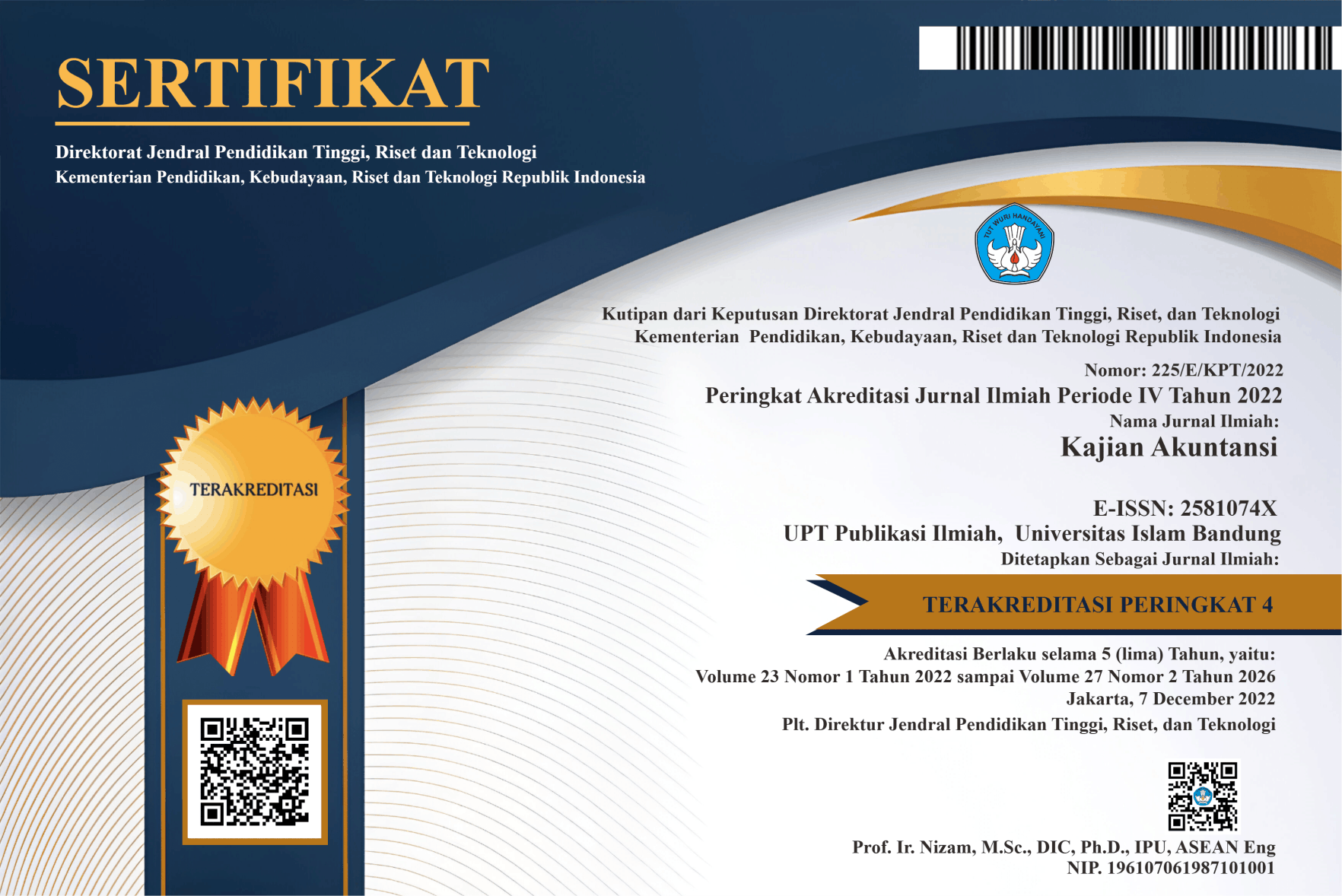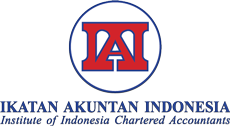FACTORS THAT AFFECT PERFORMANCE ISLAMIC BANKS IN INDONESIA
DOI:
https://doi.org/10.29313/kajian_akuntansi.v25i1.3275Abstract
This study examines the effect of capital adequacy, investor customers, Sharia governance, debt-equity ratio and company size on financial performance at Islamic Commercial Banks in Indonesia for the period 2016-2021. The population in this research is all Islamic banks in Indonesia. The sampling technique used in this study is non-probability sampling, which uses the purposive sampling method. The sample of this study was 60 data from 10 selected Islamic banks. Data processing using Eviews 12.00. The data regression analysis method was used. The results showed that capital adequacy has a significant positive effect on financial performance, company size has a positive and significant effect on financial performance, sharia governance has a significant effect on financial performance, debt equity ratio has a negative and significant effect on financial performance and investor customers have no significant effect on the financial performance of Islamic banks in 2016 - 2021.
Keywords : Financial Performance, Capital Adequacy, Sharia Governance, Debt-equity Ratio, Company Size.
References
Agudo-Valiente, J. M., Garcés-Ayerbe, C., & Salvador-Figueras, M. (2015). Corporate social performance and stakeholder dialogue management. Corporate Social Responsibility and Environmental Management, 22(1), 13-31. https://doi.org/10.1002/csr.1324
Andrianto, & Firmansyah, M. A. (2019). Islamic Bank Management (Implementation of Theory and Practice). In CV. Qiara Media Publisher.
Archer, S., Karim, R. A. A., & Al-Deehani, T. M. (1998). Financial Contracting, Governance Structures and the Accounting Regulation of Islamic Banks: An Analysis in Terms of Agency Theory and Transaction Cost Economics. Entomologia Experimentalis et Applicata, 103(3), 239-248. https://doi.org/10.1023/A
Ardila, D., Andriana, I., & Ghasarma, R. (2022). Analysis of Banking Financial Performance at Islamic Commercial Banks in Indonesia. Al-Kharaj: Journal of Economics, Finance & Islamic Business, 5(1), 1-15. https://doi.org/10.47467/alkharaj.v5i1.1091
Astuti, K. D., Retnowati, W., & Rosyid, A. (2015). The Influence of Capital Structure on Profitability (Study on Public Go Companies that became the 100 Best Companies Version of Fortune Indonesia Magazine for the Period 2010-2012). Journal of Accounting, 2 (2339-2436), 49-60.
Baehaqi, A., Birton, M. N. A., & Hudaefi, F. A. (2020). Time value of money in Islamic accounting practice: a critical analysis from maqāṣid al-Sharī'ah. Journal of Islamic Accounting and Business Research, 11(9), 2035-2052. https://doi.org/10.1108/JIABR-09-2018-0155
Baklouti, I. (2022). Is the Sharia supervisory board a friend or an enemy of Islamic banks? Journal of Islamic Marketing, 13(2), 526-541. https://doi.org/10.1108/JIMA-04-2020-0118
Carvalho, P. V., Shah, S. S. H., Zaheer, A., Mata, M. N., & Morão Lourenço, A. (2022). The Effect of Inventory Leanness on Firms' Credit Ratings: The Case of Pakistan. Risks, 10(12). https://doi.org/10.3390/risks10120226
Decker, R., Haltiwanger, J., Jarmin, R., & Miranda, J. (2014). The role of entrepreneurship in us job creation and economic dynamism. Journal of Economic Perspectives, 28(3), 3-24. https://doi.org/10.1257/jep.28.3.3
Ekawati, & Anhar, M. (2020). The Effect of Profitability, Sharia Supervisory Board and Investment Account Holder on Disclosure of Islmaic Social Reporting. Journal of the Faculty of Economics, Department of Accounting, Indonesian College of Economics, 1-18.
El-Gamal, M. A. (2007). Incoherence of Contract-Based Islamic Financial Jurisprudence in the Age of Financial Engineering. Wisconsin International Law Journal, 25(May), 1-15.
Elamer, A. A., Ntim, C. G., Abdou, H. A., & Pyke, C. (2020). Sharia supervisory boards, governance structures and operational risk disclosures: Evidence from Islamic banks in MENA countries.
Global Finance Journal, 46. https://doi.org/10.1016/j.gfj.2019.100488
Farook, S., Kabir Hassan, M., & Lanis, R. (2011). Determinants of corporate social responsibility disclosure: the case of Islamic banks. Journal of Islamic Accounting and Business Research, 2(2), 114-141. https://doi.org/10.1108/17590811111170539
Fauzi, A. S., Suransi, N. K., & Alamsyah. (2016). The Effect of GCG and CSR on Firm Value with Profitability as a Moderating Variable. Infestation Journal, 12(1), 1-19.
Guerrero-Villegas, J., Pérez-Calero, L., Hurtado-González, J. M., & Giráldez-Puig, P. (2018). Board attributes and corporate social responsibility disclosure: A meta-analysis. Sustainability (Switzerland), 10(12), 1-22. https://doi.org/10.3390/su10124808
Harahap, S. S. (2018). Crisis Analysis of Financial Statements. Raja Grafindo Persada. Hartono. (2017). Portfolio Theory and Investment Analysis (B. Yogyakarta (ed.); 11th edition).
Jaiyeoba, H. B., Adewale, A. A., Haron, R., & Che Ismail, C. M. H. (2018). Investment decision behavior of Malaysian retail investors and fund managers: A qualitative inquiry. Qualitative Research in Financial Markets, 10(2), 134-151. https://doi.org/10.1108/QRFM-07-2017-0062
Cashmere. (2016). Financial Statement Analysis. PT RajaGrafindo Persada.
Kuran, T. (2018). Islam and economic performance: Historical and contemporary links. Journal of Economic Literature, 56, 1292-1359. https://doi.org/10.1257/jel.20171243
Lone, F. A., & Bhat, U. R. (2019). Does the tag "Islamic" help in customer satisfaction in dual banking sector? Journal of Islamic Marketing, 10(1), 138-149. https://doi.org/10.1108/JIMA-11- 2016-0084
Mukhibad, H. (2019). the Role of Sharia Supervisory Boards in Meeting Maqasid Syariah - Study on Islamic Banks in Indonesia. European Journal of Islamic Finance, 13, 1-10.
Mukhilisin, M. (2021). Level of Maqāsid ul-Shari'āh's in financial reporting standards for Islamic financial institutions. Journal of Islamic Accounting and Business Research, 12(1), 60-77. https://doi.org/10.1108/JIABR-03-2020-0090
Muljawan, D., Suseno, P., Purwanta, W., Husman, J. A., Yumanita, D., B, M. N., Hartono, B., Khairanis, Syaerozi, Kusumah, W., & Dewi, S. P. (2020). Sharia economy. In Bank Indonesia.
Neifar, S., Salhi, B., & Jarboui, A. (2020). The moderating role of Shariah supervisory board on the relationship between board effectiveness, operational risk transparency and bank performance. International Journal of Ethics and Systems, 36(3), 325-349. https://doi.org/10.1108/IJOES-09- 2019-0155
OJK, O. J. K. (2023). Syariah Banking Statistics. Department of Banking Licensing and Information. Oktavionita, C. B., Azizah, S. N., Fakhruddin, I., & Wibowo, H. (2022). Company Size, Capital
Adequacy, Risk, and Financial Stability of Islamic Banks in Indonesia. Journal of the Academy of Accounting, 5(1), 1-15. https://doi.org/10.22219/jaa.v5i1.19003
Ousama, A. A., Hammami, H., & Abdulkarim, M. (2020). The association between intellectual capital and financial performance in the Islamic banking industry: An analysis of the GCC banks. International Journal of Islamic and Middle Eastern Finance and Management, 13(1), 75-93. https://doi.org/10.1108/IMEFM-05-2016-0073
Rodoni, A., & Ali, Dr. Herni SE., M. (2014). Modern Financial Management. Mitra Wacana Media. Sakdiyah, 2022. (2022). Financial Performance Analysis Using Economic Value Added (EVA). https://doi.org/10.1088/1757-899X/180/1/012250
Sarkis, J., Zhu, Q., & Lai, K. H. (2011). An organizational theoretic review of green supply chain management literature. International Journal of Production Economics, 130(1), 1-15. https://doi.org/10.1016/j.ijpe.2010.11.010
shabbir&rehman, 2018. (2019). Layers of misconceptions about Islamic banking: Are Islamic banks threats, challenges and opportunities for investors? Journal of Islamic Marketing, 10(3), 874-892. https://doi.org/10.1108/JIMA-02-2018-0026
Truby, J., Brown, R., & Dahdal, A. (2020). Banking on AI: mandating a proactive approach to AI regulation in the financial sector. Law and Financial Markets Review, 14(2), 110-120. https://doi.org/10.1080/17521440.2020.1760454
Wahyuni, S., & Aidah, R. N. (2022). Measuring Financial Performance of Islamic Banking During the Covid-19 Pandemic and its Determinant Factors. IOSR Journal of Economics and Finance (IOSR-JEF), 13(2), 10-17. https://doi.org/10.9790/5933-1302041017
Wardani, D. K., & Khoiriyah, D. (University of S. T. (2018). The Effect of Business Strategy and Company Characteristics on Tax Avoidance. Dewantara Accounting, 2(1), 25-36.
Yuan, D., Gazi, M. A. I., Harymawan, I., Dhar, B. K., & Hossain, A. I. (2022). Profitability determining factors of banking sector: Panel data analysis of commercial banks in South Asian countries. Frontiers in Psychology, 13. https://doi.org/10.3389/fpsyg.2022.1000412















